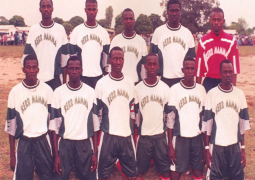
Since the outbreak of the deadly Ebola virus in Guinea in May and making its way rapidly through four countries in West Africa more women than men are contracting the virus.
In Africa we all know that it is our culture for women to look after the ill especially when it has to do with their husbands, children or relatives.
According to UNICEF, women account for 55 to 60 percent of victims who have died from Ebola in the current epidemic in Liberia, Guinea and Sierra Leone but figures may actually be even higher.
Health teams in Liberia recently reported that women made up 75 percent of the victims who were infected or died from Ebola, the Washington Post reported.
The disease spread when there is direct contact with the blood, body fluids and tissues of infected animals or people, which is more of a risk for women who are expected to spearhead taking care of ill family members and preparing for funerals, according to UNICEF.
In Africa women are the care givers, when the child is sick, men will say go to your mother and when the husband is sick, he runs to the wife so is obvious in the case of Ebola women will be at risk more than men because a woman cannot stand seeing someone she loves dying. The women have to bear the burden of attending to the sick.
Women in Africa are also traditional birth attendants, nurses, dry cleaners in clinics and hospitals and since Ebola is transmitted through direct contact with bodily fluids they could be at risk.
In The Gambia, our health authorities, youths, religious leaders are doing everything possible to keep the country an Ebola-free nation since the outbreak of the virus.
We have women groups in the country like “Yaicompins”, “Kanyelengs”, and a lot more that play major roles in the dissemination of information to the public. These women can be used in the fight against the deadly Ebola virus.
Women are the ones left at home when men are at work, women are in the markets selling, women can be found everywhere and they take health issues seriously so they should be the right target for Ebola trainings and sensitization in the country.
Keeping Gambia Ebola-free nation is a collective effort and women should not be left behind.
We know that men are in the forefront of the fight against Ebola in the country but we should not forget that when we talk about hygiene, women are the key players because they have all the time in the world to spend with their family and see to their well being.
The “Kanyelengs” or traditional communicators are vocal and influential in our society and they play major roles in malaria sensitization with their melodious songs that are not just for the sake of singing but also contain powerful messages.
They have what it takes to push the Ebola message to the public; they are women and know how it feels when a loved one dies of a disease that could be prevented.
Women who suffered from Ebola in the affected countries and recovered are not welcome back to the society; they are rejected by their own people and stigmatized due to the fear related to Ebola.
When you listen to their stories, you will find out that they contracted the disease after helping an infected person who they are related to in one way or the other.
It is not a surprise that women suffer in every bad situation around the world, be it war or disease outbreak. Women continue to be victims but despite all that they continue to help when the need arises.
In The Gambia, one of the preventive measures and the most common but very important is for people to reduce or stop hand-shaking.
It is common and it happens every second but since it is a preventive measure that our health authorities have advised us to adhere to so as to stay away from, it is worth it.
Prevention, people should remember, costs nothing but curing a disease costs money and time.
We all are aware of the measures put in place by the health ministry such as sensitizing the health journalists, training youths to go out to communities and sensitize on the preventive measures and hygiene.
Women are the ones found in the homes, even if there are men, it is women who care to listen so they should be involved in the sensitization in their various communities.
As of now there is a lot of misinformation going on in our communities as regards Ebola and women are the only ones who can put that to rest if they are well equipped with the right message.
You may be wondering why women are the caregivers, mothers, wives, sisters and aunts and they are the source of information. Women are the ones that take care of the sick and the elderly every day.
She-she-she is in solidarity with all those women that gave up their lives to help their relatives infected with Ebola and it is the duty of every African, whether in North, South, East or West to believe in the existence of Ebola and together we will keep up the fight against it.
Women are the caregivers, reach the women and equip them with the right messages so that Ebola will not set foot in The Gambia.




